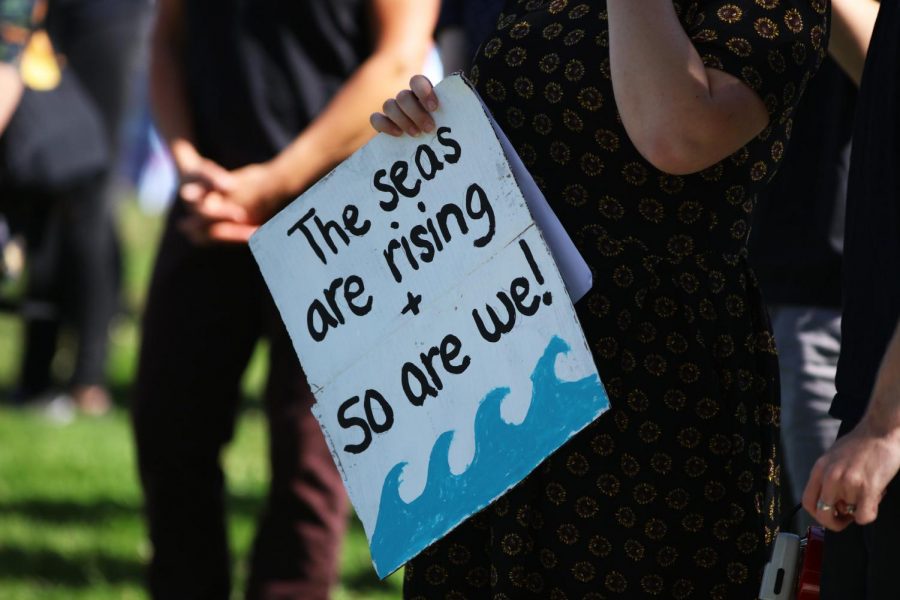It’s about time that we all take the internalized guilt of living a “conscious environmental lifestyle” and throw it in the trash.
After attending the climate strike on Sept. 20, it was hard not to feel a wave of encouragement. Along with the mass of people that had gathered by the University of Massachusetts campus pond, Overall, it is encouraging that a mass popular movement, led mostly by young people, is taking a stand against the egregious assault and systematic destruction of the only habitable place known in our unfathomably expansive universe.
But as I stood there, I couldn’t help but think about the sulking theme present multiple times at the event. While it was obvious that most people in attendance were aware of the necessity of systematic change that is imperative to oppose climate catastrophe, the repeated notion of individual effects in the field of consumption was ever present. “What you can do to stop climate change!” This strategy misses the mark, leaving people alienated and the planet still overburdened with carbon emissions. If I take shorter showers, recycle more, eat less meat and turn off the lights when I leave a room, I still have no impact on the belching of global industrial emissions that cloud the atmosphere. Simply put, the solutions that we are presented with are a farce, as proved by the reality of recycling. Your effect is on such a small scale that no matter how green your lifestyle is, 100 companies produce 71 percent of carbon emissions and the United States military is still the largest institutional source of carbon emissions.
I’ve been trying to live a greener life for years. I want to see the world survive. I want to survive. If I do my part, why are global carbon emissions still increasing? I’m doing my part and I imagine many others are as well, yet nothing is getting better. What conclusions can be drawn?
I see the dire need for the mode of production that we have embraced as “the only system that works” to change. It is ignorant to push for simple reforming measures to the capitalist mode of production as an effective response to our impending crisis. Endless economic growth is incompatible within the current ecosystem that we inhabit.
I feel guilty for the life that I am made to live, and after attending the climate strike, I have a hunch that I am not the only one stricken by this guilt that we are told to feel.
Recently, Swedish teenage climate activist Greta Thunberg visited the United Nations Climate Change Conference. A gif of her looking very displeased as Donald Trump walked on screen went viral. That’s when members of the Democratic party such as Amy Klobuchar retweeted her reaction, using the image of Thunberg to “resist” Trump and climate change, I guess? How many of these politicians co-opting Thunberg’s image and diligent climate activism were dismayed at the ambition of the Green New Deal and cried about its feasibility? These politicians that refuse to fight for change seem to have the fundamental philosophy of “I don’t want to do it, leave it to the kids to fix.” Just like the impending climate tragedy they left us and the system reliant on environmental degradation and human exploitation, they refuse to actually do anything.
Fine, it’s up to us — but with this uncomfortable truth, we must come to terms with some realities. Distance yourself from that guilt that you are told is deeply connected to your existence. It isn’t up to you to make individual changes while everything stays the same. What you need to do as an individual is understand that the only thing that will make a systematic change in the world isn’t your reliance on a few politicians who will not stand up for global justice. It is up to us, the youth and young adults, to conceptualize our relations to a rapidly destabilizing planet and the necessity to take action.
Events like the Sept. 20th global strike are in the nature of that necessary popular action. This isn’t enough. A rally in a field sanctioned by the University is hard to label as a strike. We need every member of the human race to take action. Every person that joins a rally, marches in the street, demands change and organizes their community builds so much more toward actual improvement in lieu of something such as recycling or abandoning meat — not that these aren’t valiant actions toward a more sustainable world, but one trumps the other in priority regarding the urgency of our situation.
Two futures exist. One where we look back and say we knew what was happening but we never stopped it; the other we can look back and be proud of the struggle that we overcame.
Jesse Gwilliam can be reached at [email protected].



















